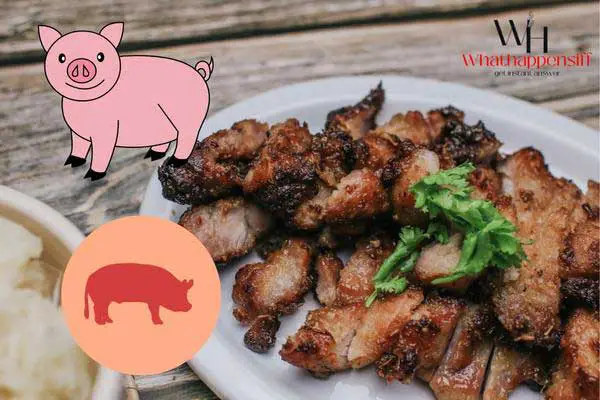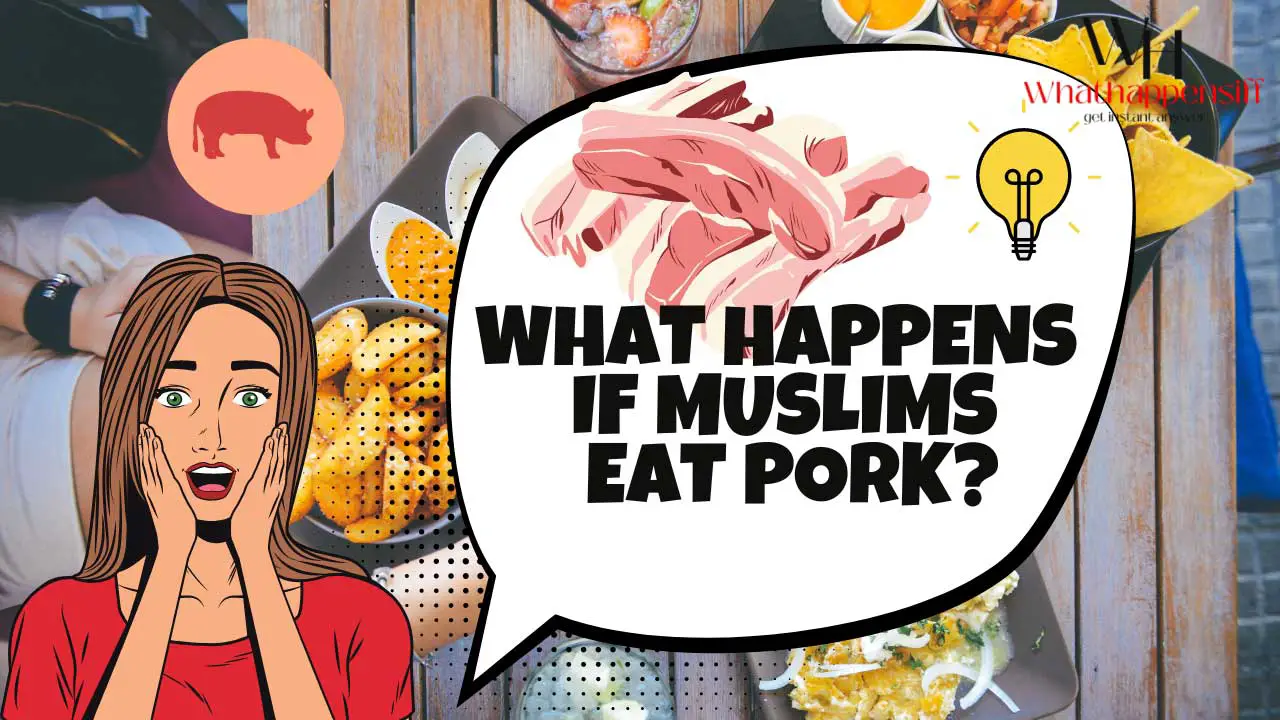In Islam pork is a forbidden food item. The reasons are both spiritual and scientific. Pigs’ lifestyle is not muchly sacred according to Islamic researchers. Its meat contains impurities healthwise. Scientifically it is also a proven fact that its meat carries bacteria, fats, and toxins.
What happens if Muslim eat pork? Eating pork unintentionally by mistake will not be considered a sin. But if Muslims eat it on a regular basis it’s sin and a forbidden foodstuff. It’s deemed impure to Muslim belief.
From a health perspective, it does not mean you will get ill or die instantly after eating pork. Obviously, you will never die after eating its meat, its impurities will take time to exploit your spiritual and religious purity.
Many people think will Allah forgive me for eating pork?
If you seek forgiveness after by chance consumption of pork meat, Allah will surely forgive you and wipe off all impurities.
5 Risks Associated With Eating Pork As A Muslim
Consuming pork as a Muslim is an extremely wrong deed if someone does it on regular basis. There are many risk factors associated with haram or forbidden food stuff consumption in Muslims. Let’s read out:
- First of all the person who eats pork after knowing its haram will be sinful. He will be punished. However, there are certain situations when you don’t find anything to eat or starving to death you are allowed to eat haram food only, Otherwise, Muslims can’t do this.
- Secondly, eating pig meat can destroy the sense of spiritual purity in Muslims. Islam is not a superficial religion, it has a deep spiritual sense. If you want to feel this sense, you have to stay out of impurities or things considered forbidden in Islam.
- Thirdly, Eating pork can ruin a Muslim’s relationship with Allah, as it is an act of disobedience to him. Additionally, eating pork can hinder a Muslim’s progress on the path to attaining spiritual enlightenment.
- Fourthly, pig meat consumption has been linked to an increased risk of certain types of cancer, including oesophagal and colon cancer. Eating pork has also been linked to an increased risk of diabetes, as well as reproductive issues such as infertility and miscarriage.
- Finally, from a nutritional perspective, Pork contains unhealthy levels of saturated fat and cholesterol, which can lead to an increased risk for heart disease.
For some Muslims, the decision to eat pork may be swayed by a lack of knowledge about the spiritual implications of consuming pork. It is important for Muslims to be educated about the prohibition of pork and the spiritual consequences of eating pork. Others may choose to consume pork out of extreme hunger or in a situation of necessity, in which case God is Most Forgiving as long as they repent afterward.
Some Muslims may also choose to eat pork because they were raised in a society where it is considered acceptable. In this case, it is important for Muslims to educate themselves about the Quran and the teachings of Prophet Muhammad.

Why Pork Is Haram Is Forbidden For Muslim
Muslim follow Holy Quran and Hadith. It is clearly mentioned in Quran that Pork meat is not allowed for Muslims. See the verses below from Surah Al Nahl with translation
اِنَّمَا حَرَّمَ عَلَيۡكُمُ الۡمَيۡتَةَ وَ الدَّمَ وَلَحۡمَ الۡخِنۡزِيۡرِ وَمَاۤ اُهِلَّ لِغَيۡرِ اللّٰهِ بِهٖۚ فَمَنِ اضۡطُرَّ غَيۡرَ بَاغٍ وَّلَا عَادٍ فَاِنَّ اللّٰهَ غَفُوۡرٌ رَّحِيۡمٌ
(16:115) Allah has forbidden you only carrion, and blood, and the flesh of swine; also any animal over which the name of any other than Allah has been pronounced. But whoever eats of them under compelling necessity – neither desiring it nor exceeding the limit of absolute necessity – surely for such action Allah is Much Forgiving, Most Merciful.
The lifestyle o pigs are full of dirt. It eats everything even its own feces. It further initiates the growth of cancer cells in pig meat. When people eat it these toxins are transferred to human blood and by continuous eating, they would one day feel its side effect.
What To Do If a Muslim Eats Pork Accidentally
Suppose you land in some non-Muslim country and buy a sandwich without knowing it has pork in it. You eat it up and then someone tells you that there was pork in it. Now, what should be the next step? Obviously, you can’t bring it back to your stomach if you have already eaten it.
No need to get panic, eating a few bites by mistake will not harm your religion or health. It will not even bring punishment of sin for you. All you need to do is to seek forgiveness and avoid eating any unknown food in the future.
What Happens When Christians Eat Pork
In Christianity, there is a lot of controversy regarding pig meat Some Christians believe that they are free to eat whatever they find. They argue that
Jesus says “All food is Clean”
However, in the Old Testament, there are proofs that God has set dietary restrictions for Christians to eat pure. About pigs, there are verses saying Pigs do not consume cud, so it’s unclean for you. Christians seem divided on this belief. It has now become a matter of faith. Some Christians who don’t have knowledge of the Old Testament freely eat pork, while others who are strong in faith don’t consume it.
From a religious perspective eating pork can add impurities to your blood. It can hinder spiritual progress too. When blood gets mixed with impurities it no longer remains sacred. The effects of eating pork on Christians will be the same as on Muslims. It’s all matter of how you believe. Maybe you don’t notice its side effects on your physical health rapidly, but it will slowly harm your body and health.
Conclusion
Eating pork is not only forbidden by the Quran, but it also has numerous health implications. The spiritual consequences of eating pork are serious and can have dire consequences in the hereafter. Despite the consequences, some Muslims do choose to eat pork.
Ultimately, the decision to eat pork is a personal one and it is important for each person to make the best decision for themselves. It is important for Muslims to educate themselves about the teachings of the Quran and the sayings of the Prophet Muhammad in order to make an informed decision.

